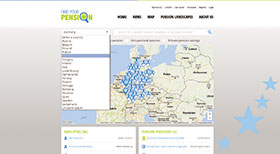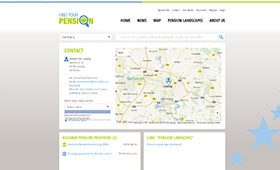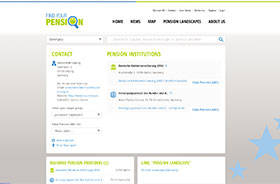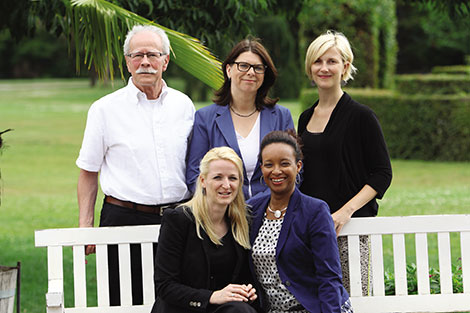An interview with Delicia Hofmann, from FindYourPension

The ‘FindyourPension’ website allows mobile researchers in the public sector to find information on their pension entitlements in different countries. We had a conversation with Delicia Hofmann to find out more about the website.
1. What are the pension challenges faced by mobile researchers today?
Mention ‘pensions’ to researchers, and don’t be surprised to see either a look of panic or resignation in their eyes. Most researchers move around, and every country in which they have lived and worked has its own pension landscape and system. The state pension is still there to protect standards of living during old-age. However, there is no European pension system.
This leads to mobile employees acquiring separate pension claims in different countries, and to eventual pension payments coming from different sources. The different pension sources, known as pillars, also differ from country to country.
In short: the topic is very complicated at first sight. And without some basic knowledge, it is difficult to plan for one’s own old-age.
2. What are the most common questions from researchers about their pension?
Often the first question is: can I be exempted from the pension scheme when I do not intend to stay on in the country?
The background to this question is that some think they’ll be losing whatever entitlement they have acquired when leaving the host country.
Therefore, the second question on the list is: can I have a refund of my contributions or transfer my claim to another pension system in the country I’m moving to or returning to?
When it becomes clear that pension payments are made abroad, and that in the case of EU/EEA countries, totalisation/recognition of state pension insurance times takes place, the next question often is, whether the pension will be enough to live on or maintain living standards.
3. Do you think that researchers are well -informed about their pension rights?
No, researchers are exactly like other professionals and employees in this regard. Young people in particular do not give much thought to old-age provisions and pensions. Thus, it is not surprising that they also know very little about it. Also at school, or while studying, the subject is absent, unless dealt with in the areas of finance and economic studies. Only when they have to start paying contributions do questions arise. However, the correct answers are not always easy to understand or might only be available in a foreign language. And so pension questions are moved to the back burner for as long as possible.
4. Could you describe Findyour Pension? Who can apply?
The FindyourPension (FYP) portal is a website about European pension systems and institutions. It assists researchers in Europe dealing with the abovementioned difficulties, and actively pursuing their own pension biography (Personal Pension Management).
We are the first international Tracking Service in Europe and are sponsored by the Federal Ministry of Research and Education in Germany (since 2011). The initiative was started by the VBL (Versorgungsanstalt des Bundes und der Länder) – occupational pension scheme for the German public sector – and has developed into a network of science employers, pension institutions and other key players within research. The user will find the following on the website:
- The responsible pension institutions – and systems – of more than 500 listed employers (‘find your provider’ service for researchers in the public sector).
- For every listed pension system (more than 50), practical FAQs (pension ABCs) about the impact/consequence of mobility on later pensions and other questions sorted according to life phase (A. Starting or changing my job; B. My pension benefits; C. Nearing retirement).
- A tool for saving individual career – and pension biography – information (My track) serving also as Personal Pension Management (My Pension Summary).



5. How does the portal work?
The users can select a country, as well as past, current or future employer. The system shows the responsible pension providers and gives basic and detailed information on Pension ABCs and the so-called Pension Landscapes. The website is based on the principle of cooperation among all the listed pension institutions. They provide the input and updates are done together with the editorial team. This ensures information is up to date and accurate.
The user can also save his/her personal career- and pensions biography in My track. Many scientists have mentioned a fear of forgetting where they have acquired pension entitlements by the time they reach pension age. My track is a sort of digital personal pension folder which can be used in parallel to job changes/moves in order to save the different pension insurance schemes.
6. Why should a researcher join Findyour Pension?
….because FindyourPension presents the different pension systems in a condensed form, explained in English, and it also explains the technical pension jargon stumbled upon within the different systems. This is complimented by videos, links, calculators etc. Researches may then discover that the subject is not as complicated or incomprehensible as they thought!
7. What is a “Pension Landscape”?
If one travels through Europe, one finds a great variety of landscapes. National pension provision concepts are also very different, just like the states. They developed in line with the history and in particular the economic circumstances of specific states. These systems have grown and are elements of social security. To find one‘s way around unknown territory, one uses a map. FYP provides such a map (MAP) for the pension jungle. With this map, mobile researchers can find their pension providers and systems, as well as understand them. The pension landscapes of the different states are described using general and comparable criteria. There is also an overview of specific national features.
8. Have workshops been organised to explain Findyour Pension?
Indeed. Since 2012 FYP has been organising so-called Consultation days, held in English, together with German universities and research facilities. Here the ‘Wheres and hows of pensions in Europe’ are explained, the website introduced and also the national (German) pension systems dealt with. Due to the size of our small team situated in Karlsruhe, Germany, we have only done this within Germany thus far. However, there are already talks to organise similar events in Switzerland, Luxembourg or Sweden. We have a medium-term plan to offer this as an online event.
9. What is the future for Findyour Pension?
FYP’s future plans are running at full speed. FYP should be expanded by adding new content and features which improve the attractiveness of the site. Plans include opening the site to other groups of professionals too. Ultimately, there are more groups with a high professional mobility, e.g. within the health care or building sectors. We are therefore collaborating with another European project called Track and Trace your Pensions in Europe (TTYPE). Furthermore, we are working on incorporating a neutral example statement of all listed providers within My track. Together with our partner project, we hope to be able to create an interface for the providers to automatically show and update individual statements and pension entitlements in the personal account. Protecting the data security and privacy principles of the European data protection laws will be paramount here. We look forward to a lot of interesting work.
